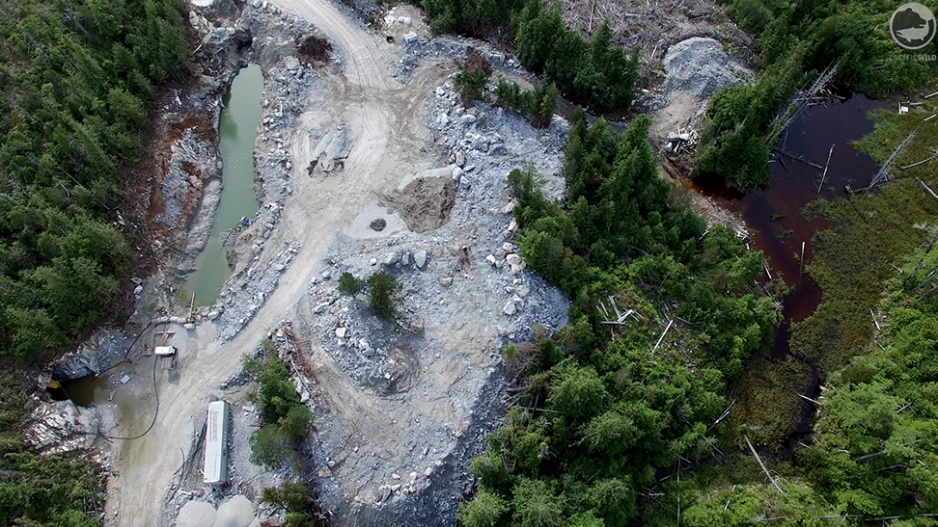A B.C. Supreme Court judge agrees with First Nations who say the B.C. government has a duty to consult them at the earliest stage of the mining development process – the staking of a mineral claim.
In a ruling today – apparently the first in which a judge was guided by DRIPA -- Justice Alan Ross stopped short of granting the injunction that First Nations had asked for.
The Gitxaala and Ehattesahet First Nations had asked for an injunction halting any further claims being granted in their territories without their consent.
The Gitxaala had also asked for the voiding of several claims already granted, including on Banks Island, where an environmental mess was left by a small gold mining operation that was shut down in 2015 for multiple environmental infractions.
While Ross did not grant the injunction or quash any existing claims, he did essentially find in favour of First Nations who argued the Crown has a duty to consult with them, even at the mineral claim staking stage.
He is giving the provincial government 18 months to resolve conflicts between the Mineral Tenure Act, Canadian laws governing the duty to consult, and the new Declaration on the Rights of Indigenous Peoples Act (DRIPA).
At the heart of the injunction application was the free entry process, in which anyone can file a mineral claim without informing relevant First Nations. Consultation only occurs at the later permitting stages.
The B.C. government has argued that the current granting of mineral claims “do not create adverse impacts that are sufficient to trigger a duty to consult,” according to today’s ruling.
Ross cited legal precedent that suggests there is, in fact, a duty to consult at the mineral claim staking stage.
“Applying the Haida Test, I find that a duty to consult is triggered by the current system of issuance of mineral claims because it causes adverse impacts upon: i. areas of significant cultural and spiritual importance to the petitioners; and ii. the rights of the petitioners to own, and achieve the financial benefit from, the minerals within their asserted territories.”
The Gitxaala and Ehattesahet argued that granting of mineral claims without consulting them is a breach of their rights under Section 35 of the Constitution Act, and also violates the consent principles of DRIPA. They asked for a finding that the Mineral Tenure Act was unconstitutional.
Ross ruled that it isn’t unconstitutional, but only because there is “discretion” within the act to exercise the duty to consult.
“I find that the chief gold commissioner… has discretion, within the existing MTA, to create a structure that provides for consultation with First Nations,” Ross ruled. “It follows that I do not find that the MTA is constitutionally invalid.”
Interestingly, Ross said he used DRIPA as “an interpretive aid” but noted it is not legally prescriptive.
“The province submits that DRIPA sets out a commitment to reconciliation and not the establishment of rights that can be enforced by the courts,” Ross writes.
“Having considered the text, context, and purpose of DRIPA and its relationship to UNDRIP, I find that DRIPA does not implement UNDRIP into the domestic law of B.C. (and) does not create justiciable rights… however, I have used DRIPA as an interpretive aid in addressing the proper reading of the MTA.
“I pause here to note that this is, to my knowledge, the first judicial consideration of the legal effect of DRIPA,” Ross added.
“I find that the proper remedy in these cases is a declaration that the province owes a duty to consult,” Ross concludes.
“I suspend the implementation of that declaration for a period of 18 months to allow the (chief gold commissioner) or the executive branch to consult and design a regime that allows for consultation (or if necessary, for the province to amend legislation). It follows that I am not granting the injunctive relief.”
Keerit Jutla, the new president and CEO of the Association of Mineral Exploration (AME) – an intervenor in the case – said there is a lot to digest in today’s ruling. A key piece of the ruling for the AME is that no existing claims have been voided.
“I think the main takeaway that has come out of this case is that, effectively, within 18 months here, industry, government and indigenous peoples now have an opportunity to modernize the Mineral Tenure Act,” Jutla said.




